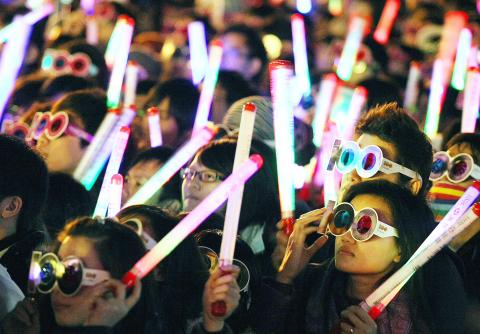The Consumers’ Foundation yesterday said a survey conducted with the Bureau of Standards, Metrology and Inspection (BSMI) showed that 58.3 percent of glow sticks sampled for safety inspections contained exceedingly high amounts of plasticizers and were asked to be removed from shelves.
Foundation chairperson Joann Su (蘇錦霞) said adults and children often hold glow sticks at concerts or festivals, but several accidents have occurred in which the liquid chemical substance inside the glow sticks had splattered peoples’ eyes. Most of these accidents were the result of improper use of the glow sticks — mainly by over bending or twisting the sticks, Su said.
The foundation and the bureau conducted safety inspections on 24 glow stick samples — 20 chemoluminescent glow sticks and four electric glow sticks — that were purchased in April.

Photo: CNA
Su said 58.3 percent of glow stick samples (14 items) were found to contain exceedingly high amounts of plasticizers, 50 percent (12 items) were found without the product safety mark, 58.3 percent (14 items) were found with Chinese-character labels that fell below the required standards.
Based on Chinese National Standard 4797 for the regulation of toys, the eight permissible plasticizers, including six Phthalate Esters (PAE), may not exceed 0.1 percent of an item’s weight.
However, the survey found that in one of the chemoluminescent glow sticks, the plasticizer di-n-butyl phthalate (DBP) made up to about 44.85 percent of its weight, or 448.5 times the standard limit.
BSMI Deputy Director-General Chuang Su-chin (莊素琴) said the bureau had demanded that all sub-standard glow sticks be removed from store shelves, adding that manufacturers and importers would be fined between NT$100,000 (US$3,327) and NT$2 million if improvements are not made.
Moreover, manufacturers or importers of glow sticks who fail to display a product safety mark may face a fine of between NT$100,000 and NT$1 million if no improvements are made, Chuang said, adding that the bureau had also asked companies to improve labels that displayed insufficient information, such as the company name or origin.
“PAEs are endocrine disrupting chemicals and may cause imbalances in a child’s hormonal system, the feminization of men and an increased rate of breast cancer for women,” BSMI senior specialist Lai Chun-chieh (賴俊杰) said.
In addition, Lai said three sampled items were found to be physically unsafe for small children, meaning that they contained small objects that are easily detachable and may be accidentally swallowed.
Chuang urged consumers to read the labels and product safety remarks on glow stick packaging before purchasing them, advised purchasers to refrain from breaking the sticks or otherwise exposing the liquid chemical substances inside and said they should wash their hands thoroughly after using glow sticks.

The inspection equipment and data transmission system for new robotic dogs that Taipei is planning to use for sidewalk patrols were developed by a Taiwanese company, the city’s New Construction Office said today, dismissing concerns that the China-made robots could pose a security risk. The city is bringing in smart robotic dogs to help with sidewalk inspections, Taipei Deputy Mayor Lee Ssu-chuan (李四川) said on Facebook. Equipped with a panoramic surveillance system, the robots would be able to automatically flag problems and easily navigate narrow sidewalks, making inspections faster and more accurate, Lee said. By collecting more accurate data, they would help Taipei

STATS: Taiwan’s average life expectancy of 80.77 years was lower than that of Japan, Singapore and South Korea, but higher than in China, Malaysia and Indonesia Taiwan’s average life expectancy last year increased to 80.77 years, but was still not back to its pre-COVID-19 pandemic peak of 81.32 years in 2020, the Ministry of the Interior said yesterday. The average life expectancy last year increased the 0.54 years from 2023, the ministry said in a statement. For men and women, the average life expectancy last year was 77.42 years and 84.30 years respectively, up 0.48 years and 0.56 years from the previous year. Taiwan’s average life expectancy peaked at 81.32 years in 2020, as the nation was relatively unaffected by the pandemic that year. The metric

TAKING STOCK: The USMC is rebuilding a once-abandoned airfield in Palau to support large-scale ground operations as China’s missile range grows, Naval News reported The US Marine Corps (USMC) is considering new sites for stockpiling equipment in the West Pacific to harden military supply chains and enhance mobility across the Indo-Pacific region, US-based Naval News reported on Saturday. The proposed sites in Palau — one of Taiwan’s diplomatic allies — and Australia would enable a “rapid standup of stored equipment within a year” of the program’s approval, the report said, citing documents published by the USMC last month. In Palau, the service is rebuilding a formerly abandoned World War II-era airfield and establishing ancillary structures to support large-scale ground operations “as China’s missile range and magazine

A 72-year-old man in Kaohsiung was sentenced to 40 days in jail after he was found having sex with a 67-year-old woman under a slide in a public park on Sunday afternoon. At 3pm on Sunday, a mother surnamed Liang (梁) was with her child at a neighborhood park when they found the man, surnamed Tsai (蔡), and woman, surnamed Huang (黃), underneath the slide. Liang took her child away from the scene, took photographs of the two and called the police, who arrived and arrested the couple. During questioning, Tsai told police that he had met Huang that day and offered to